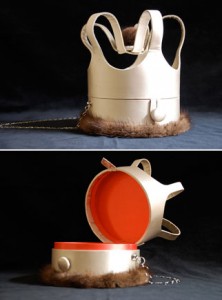“I used to be purely academic, which was wonderful in many ways,” says Karen Bates, who went through Princeton’s Ph.D. program in architecture.
“But I always had that itch to do something creative. Instead of just studying the artists, I wanted to actually make something.”
Now she’s teaching others how to do just that in her course, Soft Goods Accessory Design and Construction, and a follow-up advanced course, both of which are being offered this spring at Art Center at Night.
Bates describes her background as eclectic, which might be the understatement of the year. In addition to her studies at Princeton, the Southern California native spent three years studying in Paris at the University of Paris, La Sorbonne and translating for UNESCO; and over a decade in New York, studying at Parsons New School of Design, the Fashion Institute of Technology, and running a photography studio. In her spare time, she managed to sell mixed media artworks and soft goods and accessory designs to both individual and corporate clients.
Now she’s back in the Los Angeles region and showing students the ins and outs of soft goods and accessories in Art Center’s continuing studies program. We caught up with Karen to get the scoop on her current and upcoming courses.
Dotted Line: Tell us a little about Soft Goods Accessory Design and Construction.

Crown purse by Bates. The only fur Bates ever uses is recycled fur, coming from vintage or thrift resources.
Karen Bates: This is the first class I’ve taught at Art Center at Night, and in the spring, I’ll be teaching an advanced version of the class. In the current fall course, we’re making handbags. We go through all the intricate details of pattern drafting, and then move on to construction. The students are enthusiastic about the work, even through the process can be challenging at times. Let’s just say I give them their money’s worth in terms of educational value.
Dotted Line: So this isn’t all sketching on paper? You actually make the bags?
Bates: Absolutely. Students walk out of the course with two finished products. Drawing has its limitations—sketching is important in the conceptual stages, of course, but it’s during the construction stages when you really learn something. Plus, afterwards you have something you can bring home to mom and say, “Look what I made!” Or, if you’re an entrepreneur, you could use the bag as a prototype, take it to a factory and ask, “Can you manufacture this? How much would it cost?” From a business standpoint, that can save you a lot of start-up capital, because you’ll have already worked out a lot of those construction kinks.

